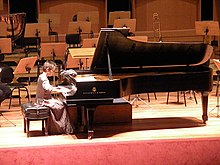Maria João Pires
Maria João Alexandre Barbosa Pires ( Portuguese [ mɐˈɾiɐ ʒwɐ̃ũ̯ ˈpiɾɨʃ ], born July 23, 1944 in Lisbon ) is a Portuguese pianist who has lived in Brazil ( Lauro de Freitas ) since 2006 and who became a Brazilian citizen in 2010. Maria João Pires was married to the violinist Augustin Dumay and has six children. She ended her active concert career in 2018 and lives in Brussels.
Life and professional history
Pires started playing the piano very early and gave her first concert at the age of five. When she was seven she played Mozart's piano concertos , and when she was nine she won first prize in the Portuguese youth music competition. From 1953 to 1960 she studied with Campos Coelho and Francine Benoît at the Conservatório Nacional in Lisbon. She continued her studies in Germany, first in Munich with Rosl Schmid at the State Academy of Music , then with Karl Engel at the Hanover University of Music .
Maria João Pires achieved her international breakthrough in 1970 when she won the international radio competition in Brussels for the 200th birthday of Ludwig van Beethoven . She would have preferred to become a chamber musician if she had “met the right musicians earlier”. She is extremely critical of the media and the international music business: “Making a career goes against music.” Like Glenn Gould, she loves the intimacy of the recording studio more than the hustle and bustle of the concert hall. Applause is rather embarrassing:
“Music is not just human creation either. There is something else. A composer has powers and possibilities within him that cannot be explained; but he, too, has it from somewhere - from the whole world, from the universe. [...] As an interpreter, I am just a broadcaster who transmits the music. "
Pires has recorded works by Johann Sebastian Bach , Ludwig van Beethoven, Robert Schumann , Franz Schubert , Wolfgang Amadeus Mozart , Johannes Brahms , Frédéric Chopin and other composers. She followed the musical history development up to Béla Bartók . She says about new music :
“The tendency that bothers me about modern music is difficult to describe. There is a lack, a lack of equilibrium, of equilibrium between the human spirit on the one hand and the infinite, the universe on the other. ... That's why I have no relationship with modernity, although there are undoubtedly some very good pieces. "
In 2012, Pires initiated a project in Brussels for the music education of disadvantaged children and a platform for collaboration between artists from different generations, which offers them development opportunities beyond the competition of the international music scene.
Discography
(see full discography on AllMusic )
At Erato :
- Mozart: The Great Concertos for Piano (1978)
- Schumann: Scenes from Children, Op. 15; Forest scenes, Op. 82; Colorful leaves, Op. 99 (1985)
- Schubert: Sonata No. 21; Impromptus (1986)
- Schubert: Piano Duets (1995)
- Bach: Piano Concertos, BWV 1052, 1055, 1056 (1995)
- Beethoven: Piano Sonatas (2001)
- The Complete Erato Recordings (2014)
At Deutsche Grammophon :
- Schubert: Sonata; 6 Moments Musicaux; 2 Scherzi (1989)
- Mozart: The Piano Sonatas (1991)
- Brahms: The Violin Sonatas (1992)
- Mozart: Piano Concertos Nos. 17 & 21 (1995)
- Chopin: The Nocturnes (1996)
- Mozart: Three Piano Sonatas; Schubert: Impromptu No. 1 (1998)
- Moonlight: Beethoven's Sonatas "Quasi una Fantasia" (2001)
- Beethoven: Complete Violin Sonatas (2002)
- Mozart: Piano Concertos Nos. 21 & 26 (2003)
- Schubert: Résonances de l'Originaire (2005)
- Chopin (2008)
- Mozart: Piano Concertos Nos. 20 & 27 (2012)
- The Wigmore Hall Recital: Schubert, Brahms, Mendelssohn (2013)
- Maria João Pires: Complete Solo Recordings (2014)
Trivia
During a rehearsal in the Concertgebouw in Amsterdam, scheduled for a public lunch concert in 1999, Pires was the soloist in a piano concerto by Wolfgang Amadeus Mozart. When the conductor Riccardo Chailly began the orchestral introduction, the pianist got a shock because instead of preparing for the concert in D minor, K. 466, she had prepared for another. Since the conductor did not knock despite the pianist's objection, she had to adjust to the new situation during the long orchestral introduction and play a concert by heart which, according to her own statements, she had not played for a long time and which she nevertheless mastered with ease.
Individual evidence
- ^ Peter Moon: Ode to Maria João Pires. In: Época . June 18, 2010 (Portuguese)
- ↑ a b c The great pianists of the 20th century . Supplement to the CD collection. Philips Music Group 1998
- ↑ Susanne Kübler: Classic of the week: The wrong Mozart. In: Tages-Anzeiger . October 25, 2013
| personal data | |
|---|---|
| SURNAME | Pires, Maria João |
| ALTERNATIVE NAMES | Pires, Maria João Alexandre Barbosa (full name) |
| BRIEF DESCRIPTION | Portuguese pianist |
| DATE OF BIRTH | July 23, 1944 |
| PLACE OF BIRTH | Lisbon |
